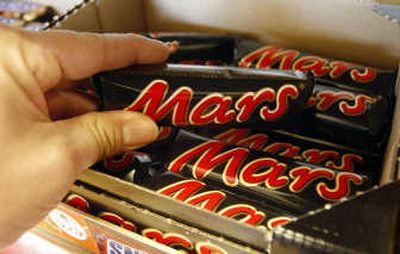Candy makers face price-fix probes

NEWARK, N.J. – If you thinkyour Valentine’s Day chocolates are less than a sweet deal this year, you’re not alone. Regulators are investigating price fixing among candy makers in at least three countries.
In the past week, the German Federal Cartel Office raided the offices of seven leading chocolate companies including Mars Inc., Kraft Foods Inc. and Nestle SA searching for documents. Three months ago, Canada’s Competition Bureau searched the offices of several companies, many of the same ones as in Germany.
The Canadian investigation sparked several American lawsuits accusing the world’s biggest chocolate companies of violating antitrust laws.
The U.S. Department of Justice declined to confirm it is investigating, but several companies said they have received inquiries.
The retailers and consumers who filed suit allege the companies needed to fix prices because while the costs for raw materials such as milk and cacao have increased, sales of chocolate in the United States have remained relatively flat in recent years. Chocolate manufacturer sales grew by 2.9 percent in 2007 to $16.3 billion, according to the National Confectioners Association.
The cases detail how informants kept letters for years, showing that Canadian executives exchanged confidential pricing information dating to 2002 via e-mail, phone and meetings.
Marilyne Nahum, a spokeswoman for the Competition Bureau, declined to discuss the details of the ongoing investigation and said no charges have been filed. The companies could face criminal conspiracy charges, which carry penalties of as much as $10 million Canadian dollars and five years in prison.
According to affidavits submitted in an Ontario court to obtain search warrants, top executives at Hershey Co., Mars and Nestle met in coffee shops, restaurants and conventions to set prices. The volume of commerce involved is potentially in the billions of dollars per year.
The German Cartel Office has said it suspected the companies had conspired with one another to raise their prices even higher than the increase in the price of raw materials, such as cocoa and nuts, would have demanded. If the office finds evidence of collaboration, the companies face possible fines of up to 10 percent of their annual income.
Several of the companies say they are cooperating with investigators.
Mars North America was contacted in early December by the U.S. Justice Department about a preliminary inquiry concerning pricing practices in the U.S. chocolate confectionery industry, spokeswoman Alice Nathanson said.
“We will fully cooperate with any investigation that may be launched,” she said.
She also confirmed German officials visited the company’s offices in Viersen last week. In Canada, Mars continues to cooperate with the Canadian Competition Bureau’s investigation.
“As the bureau has stated, it has not reached any conclusions of wrongdoing and is still at the investigative stage,” Nathanson said.
Edie Burge, a spokeswoman for Nestle USA, said the company “is aware of a preliminary investigation into marketing practices in the U.S. chocolate industry being conducted by the Department of Justice.” Nestle will cooperate with any investigation, he said, but it has not been contacted.
A spokesman for Hershey declined to comment.
In addition to the government investigations, the companies are facing lawsuits from a gaggle of plaintiffs.
A New Jersey confectionery company filed the first lawsuit in late December, charging price fixing by an international cartel of companies – Hershey and Mars, the leading chocolate companies in the U.S., along with other companies such as Nestle and Cadbury Schweppes PLC.
The confectioners claim that a cartel raised prices three times since 2003 and planned another increase for 2008.
German officials said the companies raided this week had agreed at the beginning of the year to raise prices.
At least 45 similar suits have been filed in eight states on behalf of more than 50 consumers and companies like CNS Confectionery Products of Bayonne, N.J. CNS, a 13-year-old company that manufacturers chocolate products, sued its suppliers to get back what it called overpricing.
Chocolate sales in the U.S. have been essentially flat for the past six years, hovering at just under $16 billion annually, excluding sales from Wal-Mart, said Marcia Mogelonsky, an analyst with Chicago-based market research firm Mintel International Group. Sales of dark chocolate, which has a perceived health benefit, and premium chocolate have increased and pulled market totals up, she said.
“People have been more educated about what good chocolate should taste like, and they’re willing to pay for good chocolate,” she said.